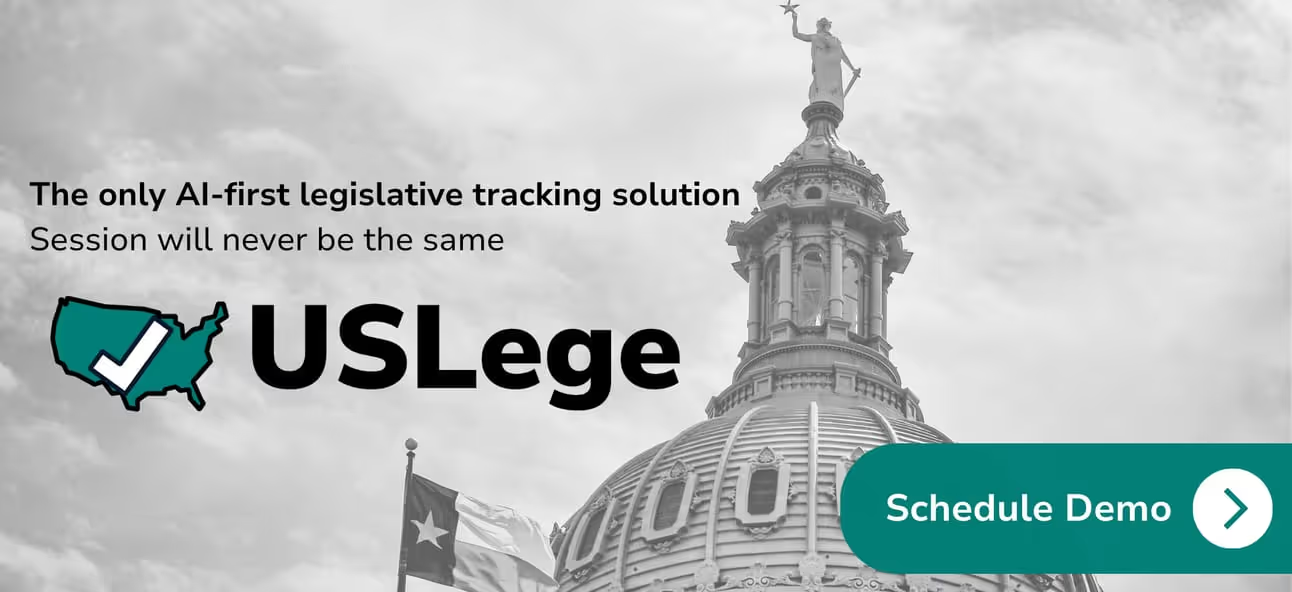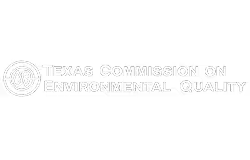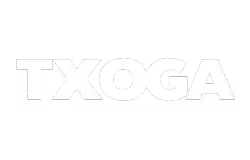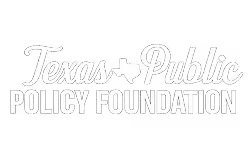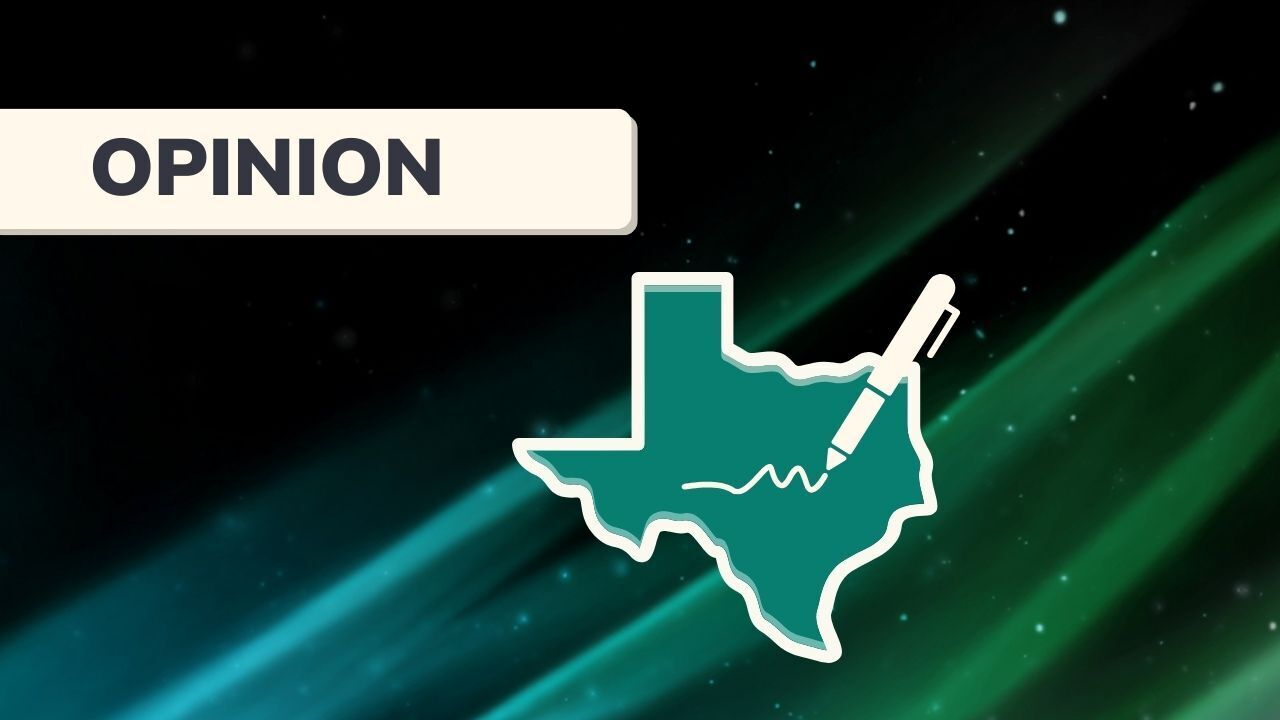
Welcome to Friday Forum, a weekly segment where we explore diverse opinions on the topics shaping Texas politics and business. The views expressed here represent the perspectives of individual contributors and are not endorsements by TXLege News. Our aim is to encourage thoughtful discussion and present a range of viewpoints on issues that matter to Texans. Email info@uslege.ai for submitting opinion contributions.
The Debate
The debate about school choice is over. What matters most now is the integrity of the education savings accounts (ESAs) program that the legislature will create during the 89th session.
The debate is over for three essential reasons. First, the governor, lieutenant governor and speaker all support school choice. In 2024, Governor Greg Abbott spearheaded a fierce political campaign to unseat House Republicans who torpedoed ESAs in November 2023 during the fourth special session. The new class of Republicans features some amazingly talented people – Katrina Pierson, Hillary Hickland, Joann Shofner, Janis Holt, Shelly Luther, Brent Money and Marc LaHood to name a few – who campaigned on school choice and will help lead passage of the bill.
Lt. Governor Dan Patrick has been a stalwart on the issue for years. As a senator in 2013, he authored SB 23 to create a school choice program and successfully passed the bill out of the Education Committee. Since then, the Texas Senate has passed no less than six bills to empower parents with educational choices, including several universal ESA bills. Dan Patrick is chiefly responsible for those victories.
Speaker Burrows voted for ESAs at least three times in 2023, twice supporting Chairman Brad Buckley’s work on an ESA bill and opposing former Rep. Abel Herrero’s decade-long budget amendment to prohibit funding for any type of school choice program.
Second, President Trump is solidly for school choice. Any Republican who opposes school choice now risks the ire of the President, who has made it de rigueur to expose wayward Republicans on social media and recruit candidates in primaries. Relatedly, every right-of-center think tank that engages in education policy supports school choice led by TPPF and TCCRI and Families Empowered in Texas; AFC, Yes Every Kid, EdChoice and Heritage Foundation nationally. There’s no daylight between President Trump and these organizations on the issue of school choice.
Third, the respective education committee chairmen, Sen. Brandon Creighton and Rep. Buckley, have done the spadework with their colleagues to establish credibility for an ESA bill. In 2023, Chairman Creighton passed out of the Senate a universal ESA bill three times. At the same time, Chairman Buckley sponsored SB 8, a parent’s bill of rights which included an ESA, and authored a nearly universal ESA, but neither was enacted.
The political debate is done.
Now, the legislature must fashion a bill that learns from best (and worst) practices in other states. A sound ESA plan would include several key provisions.
1. Universal eligibility with appropriations mechanisms to fund demand. Like the public school system that will accept any student, the ESA program should not exclude any school-aged child. While appropriations will ultimately cap how many children can enter the program in the first year, every child should be eligible. In future years, the program should fully fund an ESA for every eligible applicant. This will avoid the current situation in Texas public charter schools, where 76,000 children sit on waitlists as their parents seek, but are denied, educational opportunity. As a parallel, Florida has more than 500,000 students in its ESA and has 3.8 million school-age children. Because Texas has 6.4 million school-age children, we expect our ESA student population to quickly eclipse Florida’s.
2. A payment system that is trusted, ubiquitous, fast, and secure. Other states have online plus out-of-pocket systems using a single online web portal through which parents purchase educational expenses from approved vendors. However, a state-approved web portal cannot include all approved expenses from all approved vendors, which leads to a stop-gap solution in which states encourage parents to pay out-of-pocket for approved educational expenses and then seek reimbursement. As Arizona shows, this is a mistake that has caused transactions to take months to process. Texas can do better by designing a payment system that should meet four criteria:
- Allow parents to conveniently pay providers for educational expenses
- Complete transactions almost instantaneously
- Maintain privacy, and
- Prevent fraud and theft.
If these criteria are met, a Texas ESA will earn the trust of parents and schools. A model already exists in Health Savings Accounts (HSAs).
3. Support for parents is essential. Marketing research from other states shows there is a remarkable lack of awareness about ESAs: 46% of parents in Florida and Arizona are not aware of their state’s ESA program despite Arizona’s launching in 2011 and Florida’s in 2019. The Texas program should support participating parents:
- Select a provider chosen by the parent
- Complete an application for a provider such as a school
- Manage a student account, including payment planning
- Comply with program requirements, including deadlines, and
- Appeal a program decision.
4. Protect religious liberties and guard against regulation of families and schools. This could be achieved by making the program entirely opt-in for both students and providers and holding the money in an account for the benefit of the student and not a provider or vendor. The law should also clearly protect educational creeds, practices, admissions policies, curricula, performance standards, and employment policies. The only substantial requirement would be for program participants to take a nationally norm-referenced test or the STAAR exam to track performance.
5. Allow public institutions to serve ESA students. One of the least known provisions of the 2023 ESA bills was that any accredited public or private school could serve ESA students. This would allow visionary public school leaders to serve key groups that they know need support, including pre-kindergarten children or students who are especially vulnerable to summer slide. They could also offer programs of study to homeschooled high school students - and this is only the beginning.
The Covid-19 pandemic was eye-opening for many parents, with 60% reporting that their educational preferences and expectations changed and 80% now saying that their child’s learning could and should happen anywhere. Remarkably, half (48%) of parents are interested in new or different learning pathways. As a result, ESAs expanded rapidly. In the 2018-19 school year, just under 20,000 children participated in ESAs. Preliminary data for the 2024-25 school year shows that there are currently about 860,000 ESA students.
Texas families want educational opportunity, and they elected lawmakers who will deliver it.
John Colyandro and Michael Barba
Colyandro Public Affairs
John Colyandro served as Senior Advisor and Policy Director for Gov. Greg Abbott and his policy director on three statewide campaigns. Colyandro also served as Director of the Texas Conservative Coalition, a legislative caucus. Barba most recently served as the Policy Director of K-12 Education at the Texas Public Policy Foundation. Prior to this, he served as a specialist on the System of Great Schools (SGS) team at the Texas Education Agency.
We hope you enjoyed today’s read!
🎙️We Have a Podcast! 🎙️
Bills and Business is your go-to podcast for conversations related to Texas legislation and business. Hosted by Laura Carr, Co-Founder of USLege—an AI-driven legislative tracking software—we bring you in-depth analysis on economic trends, impactful legislation, and key developments shaping Texas business.
Subscribe on Youtube and Spotify for weekly episodes!

- 01 First
Subscribe to our Newsletter

Read more news

How Government Affairs Teams Use Legislative Tracking Software to Stay Ahead of Policy Changes
Policy professionals are expected to stay ahead of policy changes while managing constant updates across multiple jurisdictions.
Relying on manual methods makes it difficult to keep pace with how quickly bills move through the legislative process.
Government affairs teams face pressure to track legislation across Congress, states, and local bodies.
A single bill can change direction after committee hearings or amendments, leaving little time to respond.
When updates are missed, advocacy efforts, compliance planning, and stakeholder trust can suffer.
Many organizations still depend on email alerts, spreadsheets, and fragmented search tools.
These approaches lack structure and often fail to surface relevant updates at the right moment.
As regulations grow and legislative calendars tighten, teams need better visibility and control.
Legislative tracking software provides a centralized way to monitor bills, receive real-time alerts, and analyze legislative and regulatory data. Instead of reacting late, teams can anticipate developments, stay informed, and make informed decisions with confidence.
This article explains what legislative tracking is, why it matters, how teams use it, and how organizations can stay ahead of policy changes with structured tracking.
What Is Legislative Tracking Software?
Legislative tracking software is a system designed to track bills, monitor legislation, and organize legislative and regulatory data in one place.
It transforms raw information into usable insights that support analysis, reporting, and strategy.
Instead of scattered sources, users access legislation, regulations, and related data through one platform using legislative tracking software.
This structure allows policy professionals to quickly understand how changes affect priorities and stakeholders.
How It Supports Bill Tracking
Bill tracking involves following a bill from introduction through hearings, amendments, votes, and outcomes.
Tracking software allows teams to track bills across jurisdictions while maintaining a clear timeline of activity.
Centralized Legislative Data Access
With a centralized database, users gain consistent access to bills, committee assignments, and regulatory updates.
This reduces duplication and improves focus across the organization.
Why Legislative Tracking Has Become Mission Critical
Growing Legislative Volume
Each legislative session introduces thousands of bills at the federal level and state levels.
Manual review becomes impractical as volume increases.
Shorter Response Windows
Bills often move quickly from introduction to committee hearings.
Real-time alerts help teams stay ahead of deadlines and never miss key moments.
Increased Regulatory Risk
Missed policy changes can result in compliance gaps, legal exposure, and reputational harm.
Regulatory tracking helps reduce risk by improving awareness and timing.
How Government Affairs Teams Use Legislative Tracking Software
Monitoring Bills Across Jurisdictions
Government relations teams often manage activity across multiple jurisdictions.
Legislative tracking provides coverage at the federal, state, and local levels without creating silos.
Identifying Policy Impact Early
AI-powered insights surface relevant bills and policy developments before they reach critical stages.
Early analysis allows teams to anticipate impact and prepare responses.
Supporting Advocacy and Lobbying Efforts
Advocacy depends on timing and context. Real-time alerts notify teams of hearings, amendments, and votes so advocacy strategy aligns with legislative movement.
Role of Real-Time Alerts in Policy Monitoring
Alert Types That Matter
Alerts notify teams about bill movement, committee hearings, amendments, and executive orders.
These alerts reduce manual search and support faster response.
Email Alerts and Workflow Control
Email alerts deliver critical information directly to policy professionals.
Combined with dashboards, alerts help teams stay informed without overload.
Core Features That Matter Most
Advanced Search and Filtering
Search tools allow users to filter bills by keyword, sponsor, committee, jurisdiction, or date.
This ensures relevant results and better focus.
Bill Summaries and Ongoing Analysis
Bill summaries translate legislative language into plain terms.
Ongoing analysis highlights how each bill changes over time.
Reporting and Team Collaboration
Advanced reporting supports internal briefings and leadership updates.
Team collaboration improves when insights and reports are shared centrally.
Legislative Tracking vs Manual Monitoring
Manual tracking relies on constant review and fragmented tools.
Tracking software improves accuracy, speed, and coverage.
Who Benefits Most From Legislative Tracking Software?
Government Affairs Teams
Government affairs professionals use legislative tracking to manage advocacy, policy monitoring, and stakeholder communication.
Compliance and Policy Professionals
Regulatory tracking supports compliance teams by monitoring regulations and legislative changes that affect obligations.
Public Policy Managers and Analysts
A public policy manager relies on tracking tools for analysis, reporting, and informed decisions.
Best Practices for Implementing Legislative Tracking
Define Priorities Early
Teams should identify key issues, jurisdictions, and stakeholders before enabling alerts.
Align Tracking With Strategy
Legislative tracking should support a broader policy and advocacy strategy.
Review and Refine Regularly
Regular review ensures alerts and search criteria remain relevant as priorities shift.
Managing Information Overload
Filtering for Relevant Data
Strong filtering and AI-powered insights reduce noise and surface critical information.
Using Summaries to Quickly Understand
Bill summaries help teams quickly understand changes without reviewing the full legislative text.
Supporting Advocacy With Better Data
Data Driven Advocacy Strategy
Advocacy benefits from accurate data, clear analysis, and timely alerts.
Sharing Insights With Stakeholders
Teams can share updates and reports with stakeholders to maintain transparency and trust.
Security and Data Integrity
Protecting Sensitive Information
Tracking platforms prioritize security to protect legislative data and internal strategy.
Controlled Access and Permissions
Access controls ensure only authorized team members can assign tasks or generate reports.
Legislative Coverage Across Jurisdictions
Federal, State, and Local Coverage
Tracking tools provide coverage across jurisdictions to avoid blind spots.
Comprehensive Coverage Without Duplication
Teams maintain visibility without overlapping effort.
Reporting That Supports Leadership
Custom Reports for Briefings
Custom reports help leadership review policy impact quickly.
Advanced Reporting for Long-Term Strategy
Reports support long-term planning and organizational review.
Staying Ahead of Policy Changes
Anticipating Legislative Trends
Legislative tracking allows teams to anticipate change rather than react late.
Never Miss Critical Updates
Real-time alerts ensure teams never miss hearings, amendments, or votes.

Texas Political Spotlight
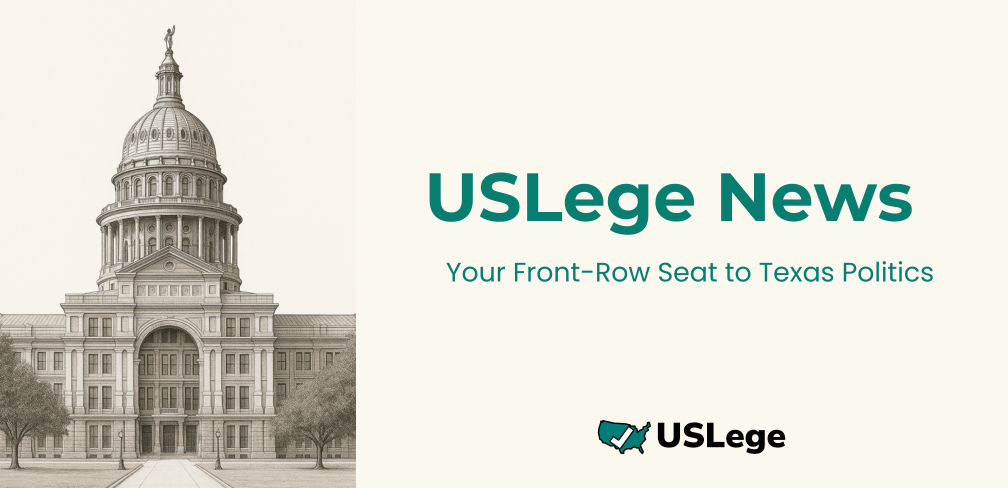
Welcome back, friends
A crowded Republican primary to replace U.S. Rep. Chip Roy is taking shape as former MLB star Mark Teixeira pours millions into his campaign and secures endorsements from President Trump and Gov. Abbott, positioning himself as the early frontrunner in a race that will likely decide the next representative for the solidly red district. At the same time, federal regulators have launched an inquiry into ABC’s The View after it interviewed Texas Senate candidate James Talarico. Meanwhile, Attorney General Ken Paxton is suing a Bastrop rendering plant over emissions described by residents as overwhelming and harmful, escalating a high-profile environmental dispute that has drawn hundreds of complaints and could result in significant penalties for the company.
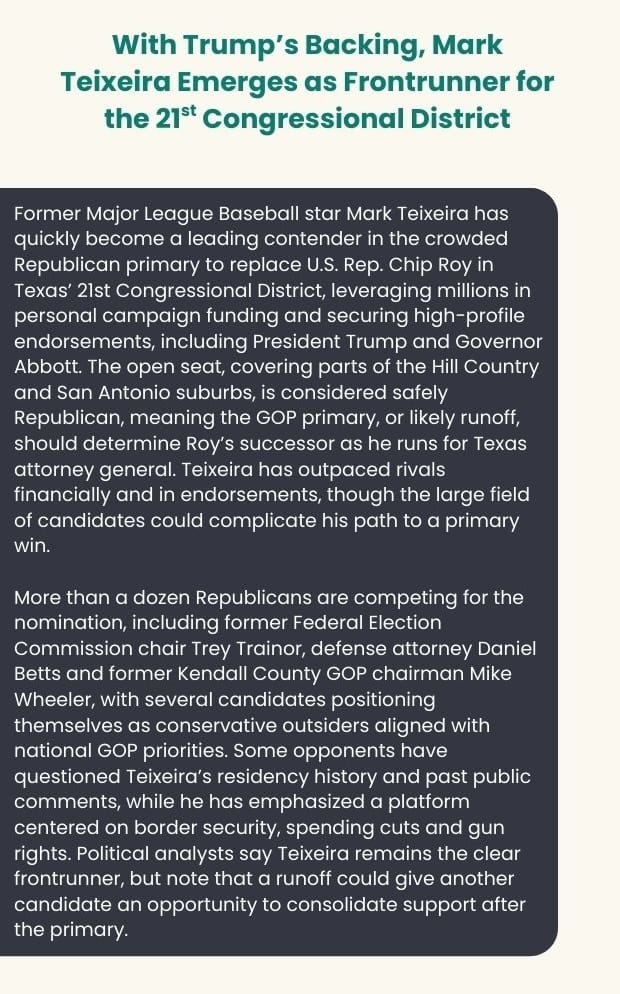
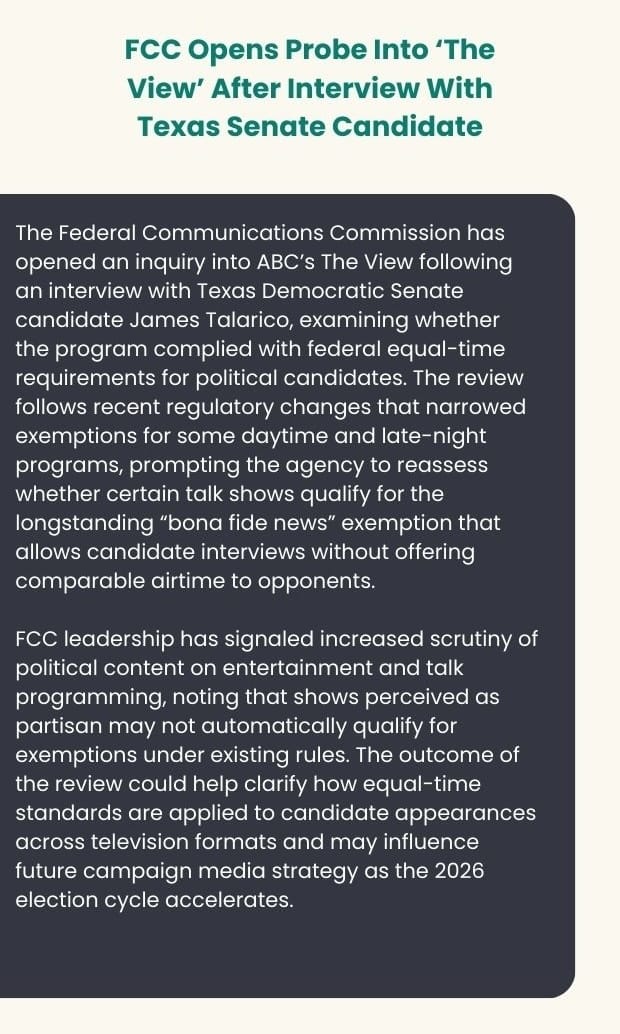
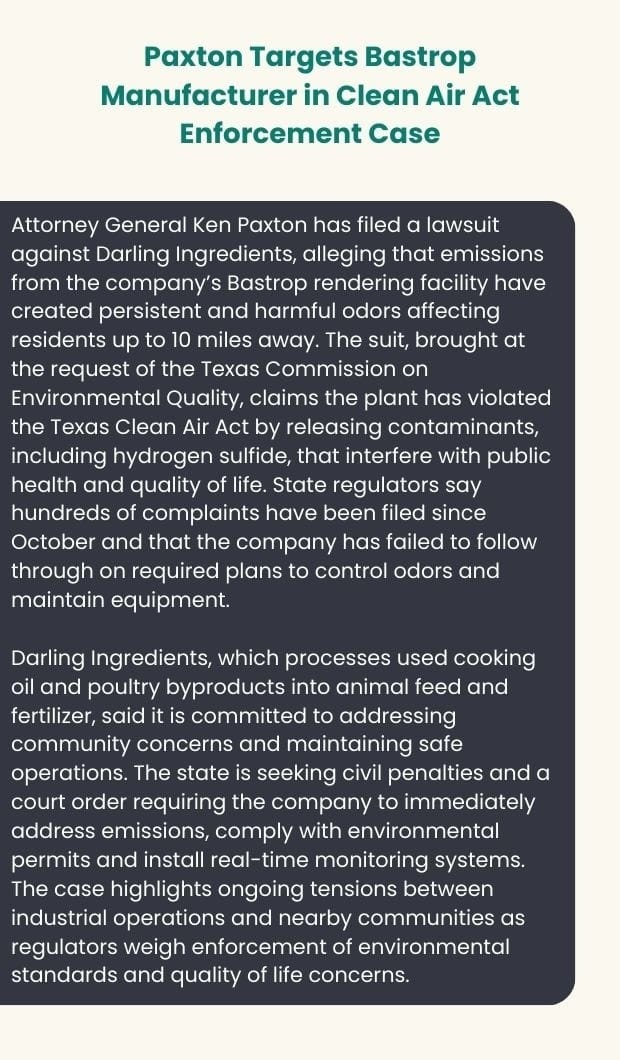
We hope you enjoyed today’s read!
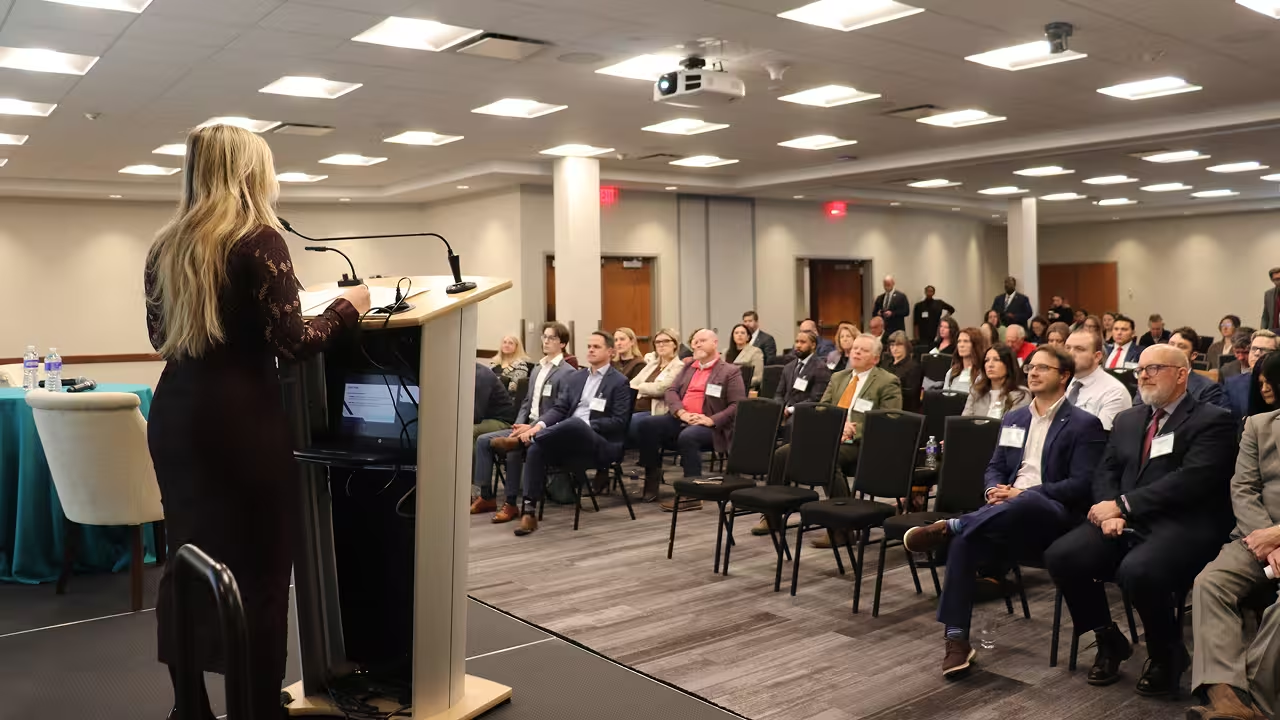
Why Governors’ Offices Need Modern Legislative Technology to Keep Up
Governors are expected to move quickly, stay aligned with their legislatures, anticipate risk, and make high-stakes decisions. At the same time, legislative activity is accelerating, policy language is constantly shifting, and critical conversations are happening in more rooms than any one team can cover.
From our perspective, one thing Governor Hochul articulated so clearly is this: modern governance requires modern tools.
Below are five reasons governors’ offices need modern legislative technology to keep up, grounded in the realities discussed at the event and informed by the lived experience that led to the creation of USLege.
1. Speed Is No Longer Optional for Governors’ Offices
Governor Hochul spoke repeatedly about urgency. Whether the issue is immigration, energy policy, budgets, or federal action, governors are expected to respond in real time. Legislative timelines do not pause, and waiting for end-of-day summaries or secondhand updates is no longer sufficient.
For governors’ offices, speed is not about reacting publicly faster. It is about knowing what is happening inside the legislature the moment it happens.
Modern legislative technology makes that possible by providing live and archived legislative video, searchable transcripts, and real-time alerts tied to executive priorities. Instead of learning about developments after the fact, governors’ offices gain immediate visibility and can engage while there is still time to shape outcomes.
.avif)
2. Governing Now Means Managing Many Crises at Once
During the conversation, Governor Hochul moved rapidly between topics that, on their own, would consume most executive agendas: immigration enforcement, climate mandates, budget negotiations, federal funding uncertainty, and electoral dynamics. The speed at which she shifted was not rhetorical. It reflected the reality of governing today.
Multiple high-stakes issues are live at the same time, often moving on different timelines and through different parts of the legislature. Governors are expected to track all of them simultaneously and make decisions with confidence, even when developments are unfolding in parallel.
This creates a structural challenge for governors’ offices. Critical information is being generated across committees, hearings, and negotiations at the same time. No single team can manually monitor it all, yet missing a development in any one area can have real policy or political consequences.
Modern legislative technology helps governors’ offices manage this complexity by monitoring legislative activity continuously and surfacing the moments that intersect with executive priorities. It ensures leadership teams are not choosing which issue to see, but instead have visibility into all of them — as they happen.
.avif)
3. Institutional Knowledge Is Critical and Increasingly Fragile
Governor Hochul emphasized the importance of understanding the levers of government. That insight applies just as strongly to governors’ offices as it does to elected leadership.
Institutional knowledge is what allows staff to distinguish noise from risk, anticipate reactions, and advise governors with confidence. But that knowledge is increasingly fragile. Staff turnover, compressed timelines, and information overload mean teams spend more time capturing information than interpreting it.
Taking notes has quietly become the job.
Modern legislative technology restores balance by preserving institutional knowledge at scale. Searchable video libraries, historical transcripts, and AI-powered summaries allow offices to retain context over time. New staff ramp faster. Experienced staff spend less time transcribing and more time thinking strategically.
Technology does not replace judgment. It protects it.
.avif)
4. Policy Risk Often Hides in Amendments and Language Changes
Another reality discussed at the event is how fluid policy really is. Bills evolve. Language shifts. Provisions are revived through amendments after appearing to be settled.
Traditional bill tracking relies heavily on keywords. But keywords miss intent, and intent is where risk lives.
Governors’ offices need visibility into how legislation is changing, not just whether a keyword appears. AI-driven legislative intelligence makes it possible to track meaning across drafts, flag material changes, and surface provisions that introduce new risk or opportunity.
This is especially critical during budget negotiations and end-of-session periods, when seemingly minor language changes can carry significant policy and political consequences.
.avif)
5. Confidence Comes From Context, Not Guesswork
Governors are expected to make decisions with confidence, even when timelines are tight and information is incomplete. That confidence does not come from more data. It comes from having the right information, with context, at the moment it is needed.
Modern legislative platforms reduce noise, prioritize relevance, and connect executive teams directly to original source material. Instead of relying on summaries filtered through multiple layers, governors’ offices can see, hear, and understand legislative developments firsthand.
When leadership teams trust their visibility into the legislature, they spend less time managing surprises and more time leading.
.avif)
The Bottom Line for Governors’ Offices Nationwide
The challenges discussed at Capitol Confidential Pro were not New York-specific. They reflect the reality of governing in every state today.
Modern legislative technology is no longer a nice-to-have. It is the foundational infrastructure for effective executive leadership.
USLege was built by people who have done this work inside legislatures, governors’ offices, and policy roles. Every feature maps to a real failure point that professionals have lived through.
For governors’ offices across the country, staying informed, aligned, and ahead now depends on tools designed for the pace and complexity of modern government.

Texas Political Spotlight

Welcome back, friends
A crowded Republican primary to replace U.S. Rep. Chip Roy is taking shape as former MLB star Mark Teixeira pours millions into his campaign and secures endorsements from President Trump and Gov. Abbott, positioning himself as the early frontrunner in a race that will likely decide the next representative for the solidly red district. At the same time, federal regulators have launched an inquiry into ABC’s The View after it interviewed Texas Senate candidate James Talarico. Meanwhile, Attorney General Ken Paxton is suing a Bastrop rendering plant over emissions described by residents as overwhelming and harmful, escalating a high-profile environmental dispute that has drawn hundreds of complaints and could result in significant penalties for the company.



We hope you enjoyed today’s read!

Texas Political Spotlight

Welcome back, friends,
Gov. Greg Abbott has ordered a statewide freeze on new H-1B visa applications at Texas public universities and state agencies. In the Democratic race for lieutenant governor, steelworkers union leader Marcos Vélez is gaining traction with major labor backing and fresh scrutiny over fundraising ties linked to Texas Majority PAC as the primary nears. Lastly, Abbott says the White House is developing a plan to “recalibrate” ICE enforcement after fallout in Minnesota, as Texas simultaneously weighs billions more for Operation Lone Star and its ongoing border strategy.
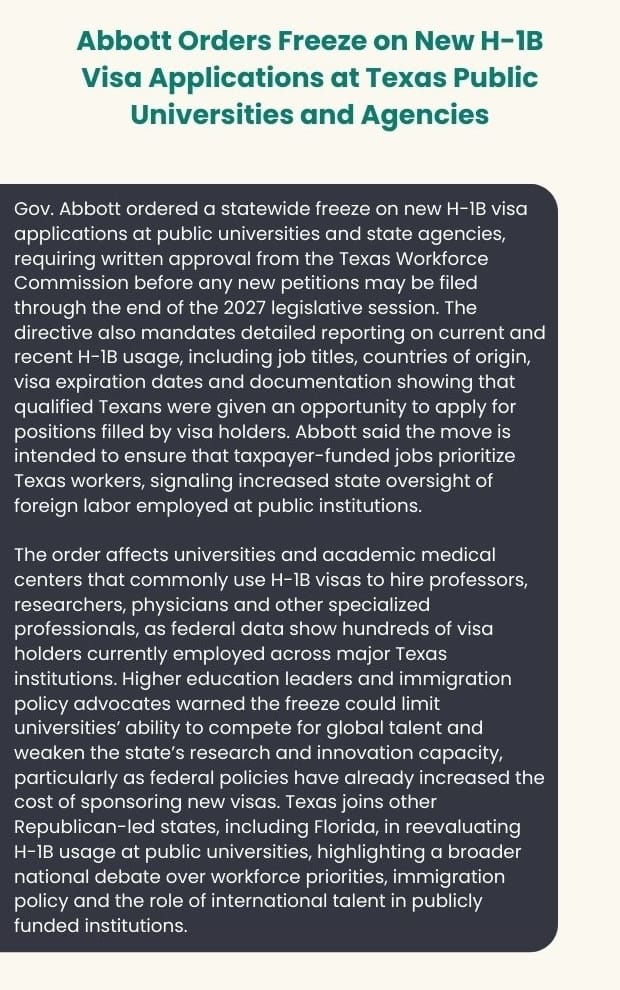
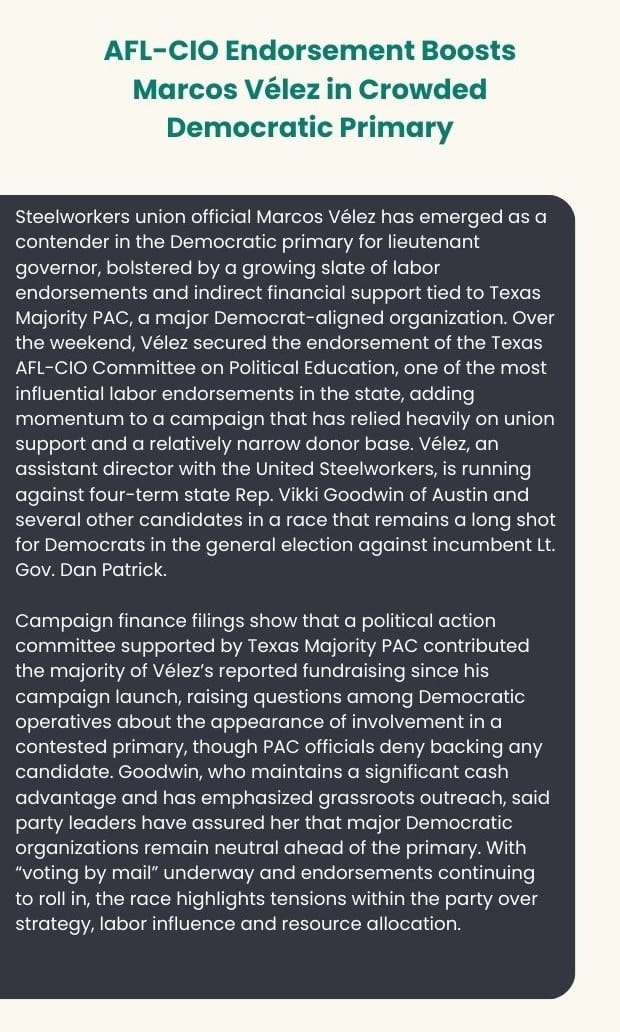
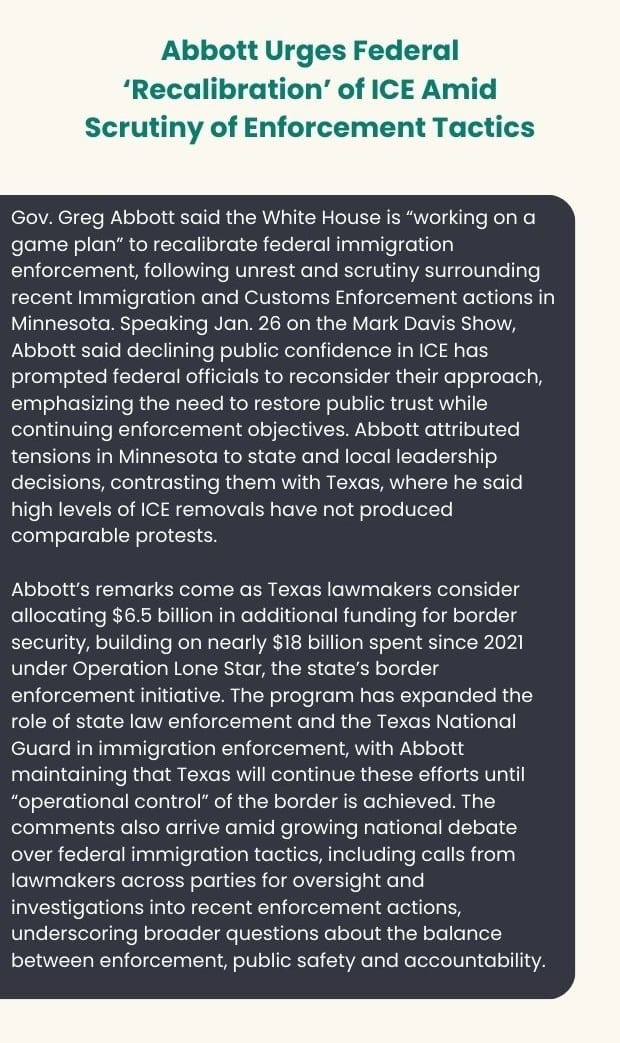
We hope you enjoyed today’s read!
Stay connected with TXLege News on X and LinkedIn!


Texas Political Spotlight

Welcome back, friends
Texas is facing a pivotal legal test over its election system as Republicans seek to end open primaries, a move that supporters frame as protecting party autonomy and critics warn could create new barriers to voter participation. At the same time, federal officials are considering a land exchange that would allow SpaceX to expand its South Texas launch site, renewing debate over how to balance economic growth with the preservation of sensitive wildlife habitat along the Gulf Coast. Lastly, a federal judge has blocked a new Texas law regulating children’s access to app stores, underscoring the ongoing uncertainty over how far states can go in policing online safety without infringing on constitutional rights.
.jpeg)
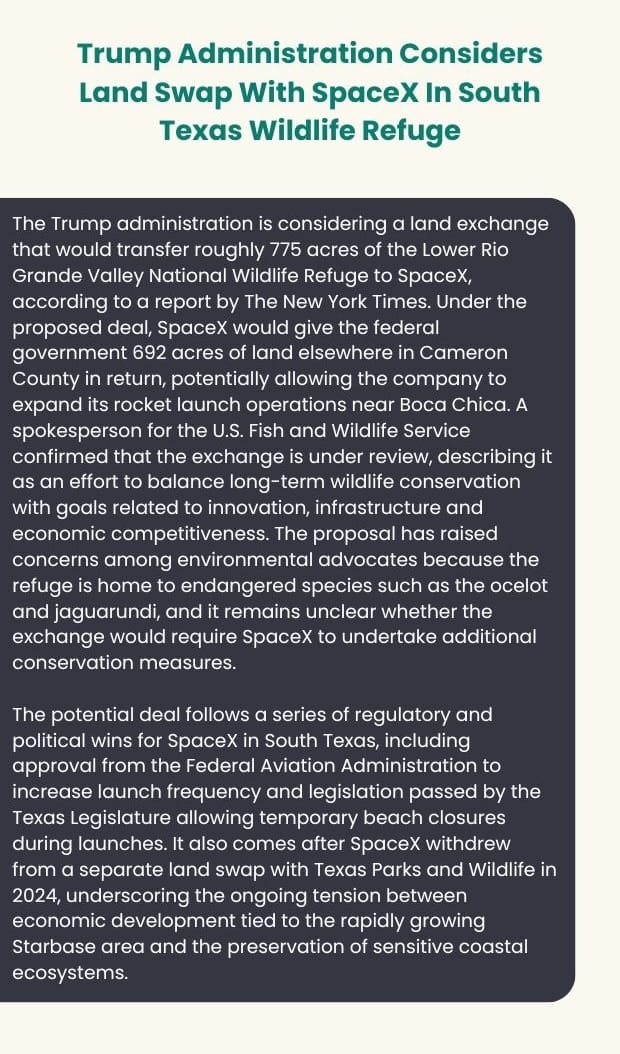
.jpeg)
We hope you enjoyed today’s read!



